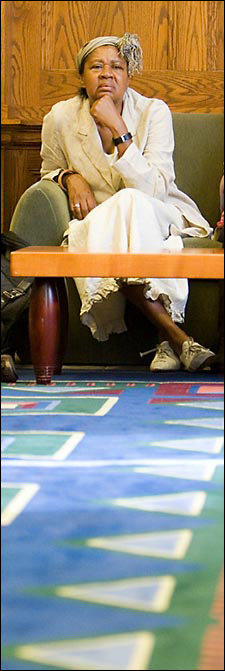Soyinka deplores decline in free expression
Nobelist in literature suggests that Christianity and Islam are in the midst of a worldwide religious war
Twenty years after winning the Nobel Prize in literature (the first African to be so honored), Akinwande Oluwole “Wole” Soyinka continues to use his fame as a bully pulpit, and his magical turns of phrase as weapons. For decades, he has employed a polymath’s blend of plays, poems, novels, and memoirs to bring art to bear against artistic repression, political tyranny, and religious excess.
On Oct. 4, the Nigerian-born Soyinka led off the 2006-07 season of Wednesday symposia at Harvard’s W.E.B. Du Bois Institute for African and African American Research. “Some feathers will be ruffled today,” warned literary critic Biodun Jeyifo. The Harvard professor of African and African-American Studies, an expert in the Soyinka canon, introduced the bluff and eloquent Nobel laureate.

Soyinka, a nonresident fellow at the institute and in 2004-06 the institute’s Alphonse Fletcher Fellow, was happy to ruffle some feathers. His hour-long talk, before a capacity crowd at the Barker Center’s Thompson Room, included gibes at the Vatican, Muslim extremists, censorious politicians, and the Internet, with its culture of high-speed rumor and miscommunication.
In one operatic riff, Soyinka imagined a simulcast lecture by Cornel West (on the comparative neatness of the beards of Jesus and Mohammed) that spawned an Internet cascade of rumors and escalating violence. Before the question-and-answer period was over, nuclear war had broken out.
But the sonorous-voiced Soyinka took principal aim at Islam and Christianity, “two of the most God-blasting and blood-stained religions in the history of humanity.” Both are crashing through the world like battling elephants, leaving only the grass to suffer, said Soyinka, who borrowed an image from an African proverb.
Meanwhile, he said, “the unassuming, nonexpansionist and nonaggressive and nonpredatory animals of the forest find their modest spaces of freedom encroached upon.”
In a larger sense, said Soyinka, “religious war” in the world and on the airwaves has spurred a decline in freedom of expression, has shriveled the courage of artists, and has given rise to a new ultimate deity: fear.
In a narrower sense, he said, the spiritual war of the elephants means that the continent of Africa in particular is in for another surge of “messianic zeal” from both peaceful Pentecostal Christians and “Muslim proselytizers of an equally rabid fundamental persuasion.”
In Africa and elsewhere, the warring religions are smothering a valuable heritage of “invisible religions,” asserted Soyinka, including Orisha, the Yoruba spiritual system that influenced him as a boy in Nigeria. From the time of the slave trade, Orisha has spread throughout the world, with its Greek-like pantheon of gods, spiritual tolerance, and emphasis on inner peace.
Being crushed along with alternate spiritual visions are the qualities they offer to the world at large, said Soyinka: nonviolence, for one, and flexibility. He praised “the accommodating spirit of African religions that absorb shocks without setting the world ablaze.”
In an age when a cartoon, or an impolitic speech by a pope, can set blazes across the world, we risk accepting “a global realm of arbitrary menace” that puts fear before creativity and dialogue, said Soyinka. At worst, he said, the world will come to “an age of universal censorship.”
The signs are already here, the Nobel laureate said. He chose one: the decision in September by a leading German opera house to call off an avant-garde production of Mozart’s “Idomeneo” for fear that some Muslims would be offended. One scene, added to the 225-year-old play and staged last in 2004, includes the severed heads of the god Poseidon, Jesus, Buddha, and Mohammed.
If self-censorship like this goes on, said Soyinka, soon any work of imagination “will dissolve into blandness” and artists of every stripe will lose “the techniques or the will to creativity.”




